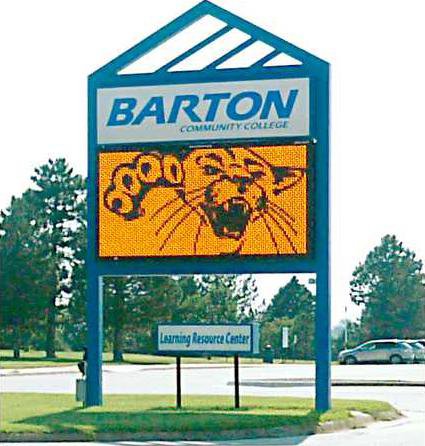The fields of science, technology, engineering and math, also known as STEM, are becoming more and more vital in society and have become an academic movement. Barton Community College features many fields of study that fall under STEM, including Engineering.
The program offers basic courses students would take in their first years at a university when seeking an engineering degree.
“In the first two years of an engineering degree, typically, a student is getting their general education courses out of the way but the main thing is to get mathematics and physics completed,” Dean of Academics Brian Howe said. “We offer the calculus sequence as well as engineering physics I and II.”
Students who are looking to attend Barton and complete an engineering emphasis can qualify for a departmental award to help fund their education. After preparing at Barton, students can transfer to a four-year school to complete their degree.
“We have a 2+2 agreement with K-State Polytechnic in Salina,” Howe said. “A student comes to Barton for a year or two acquiring the general education classes and basic physics courses before transferring to K-State Polytechnic to finish up an engineering degree in four years.”
Howe also praised the mathematics department, his old stomping ground before he became the Dean of Academics.
“On the mathematics side of things, we have some fantastic instructors here who are very knowledgeable,” he said. “You will have a great experience in preparation for mathematics if you come to Barton.”
Regarding the school’s facilities, Barton has a few features that may escape the average eye. While some schools are turning to a more virtual experience in classes such as chemistry and biology, Barton continues to invest in bringing the hands-on lab experience to these courses. The science department also possesses a planetarium which Howe calls “a hidden gem.”
“People still don’t know we have a planetarium and it is a fantastic facility,” he said. “We have planetarium shows every other week, and it’s local. You don’t have to go to Hutch, it is right here.”
Looking towards the future of its STEM programs, Barton has applied for two National Science Foundation grants. One intends to increase the number of teachers in the STEM fields in western Kansas. As current teachers begin to retire there is a need for new blood. The second grant focuses on increasing the number of minorities going into STEM-related fields.
“With these grants, we would like to start a Barton STEM Club for students,” Howe said. “Later, we would like to run a STEM camp for high school juniors and seniors who are interested and especially those who fit the underrepresented minority groups to help increase their interest in STEM.”
Barton is actively pursuing the grants and will know in October of 2018 if they received them. Howe said even if the school is unable to acquire the awards, the STEM Club is not out of the question, as he believes in providing the activity or something like it.
“From my view, even if one or both grants don’t come to fruition, the Barton STEM Club piece is very important,” he said. “We have dreams that from our STEM Club will have a robotics team that would be able to compete.”
To help bring the club to its full potential, Howe has formed a team of faculty in related fields on both the academics side as well as the Workforce Training and Community Education.
“I have a group of faculty members who I am meeting with to discuss how the STEM Club could look. The group is a team of faculty that is cross-divisional. We don’t have many of those at Barton, so I am excited to see where this is going to go,” he said. “We also hope to have some of the incoming engineering departmental award-winning students come to our gatherings so they can be a part of the inception.”
All of this, Howe said, takes a lot of work and he is grateful for his STEM team.
BCC's involvement with STEM





